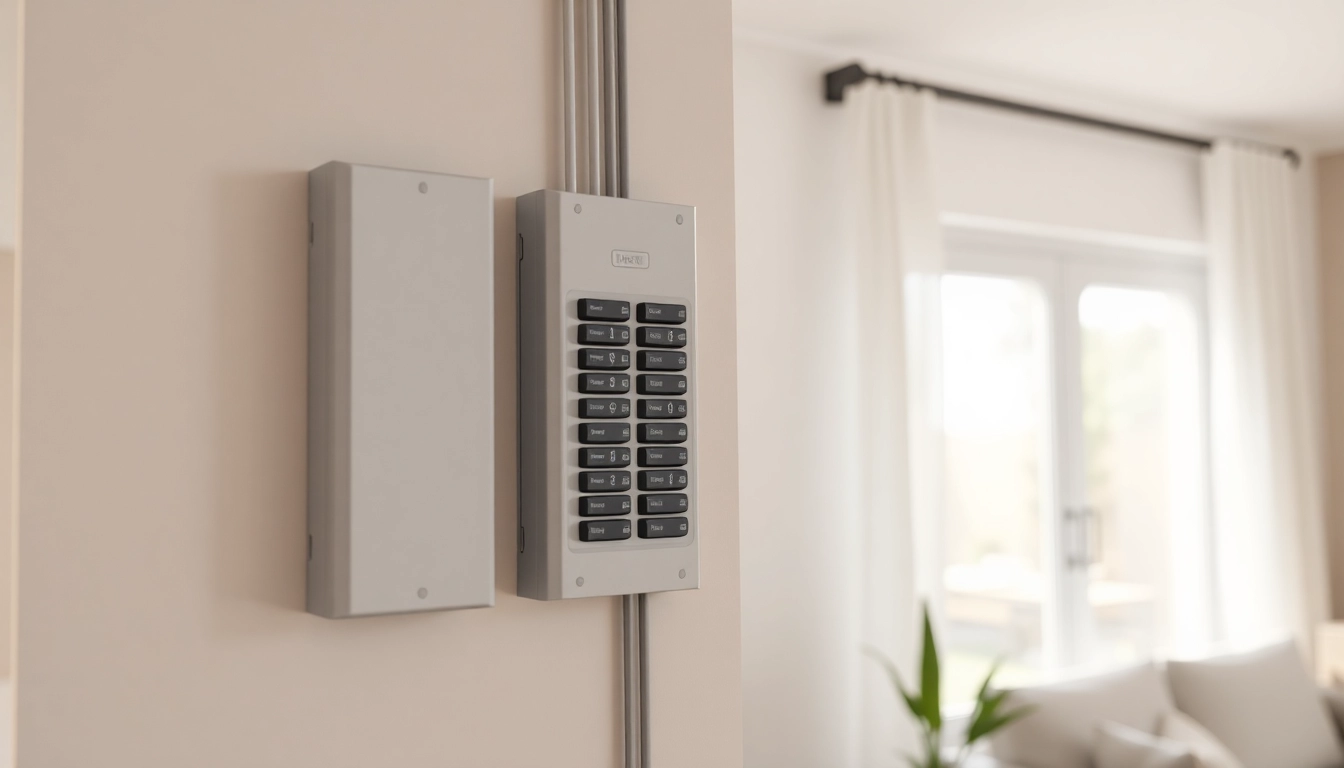The Importance of the Electrical Panel in Your Home
The electrical panel is often referred to as the heart of your home’s electrical system. It functions as a central hub where all the electrical lines in your home converge, allowing optimal distribution of electricity to the various outlets, fixtures, and appliances throughout your residence. Understanding its significance is crucial to maintaining a safe, efficient, and functional living environment. If you’re interested in delving deeper into various aspects of the Electrical Panel, this article aims to provide a thorough exploration.
Understanding the Role of the Electrical Panel
The electrical panel serves several critical functions in any household. At its core, it is responsible for receiving electricity from your utility provider and distributing it throughout your home via circuit breakers or fuses. Each circuit breaker corresponds to a different area of your home, controlling the flow of electricity to designated outlets and appliances.
A fundamental aspect of the electrical panel is its role in protecting your home from electrical overloads. In case of an electrical surge or fault, the circuit breakers within the panel will trip, stopping the flow of electricity and preventing potential damage or fire hazards. Thus, the electrical panel not only regulates power supply but also acts as a safety mechanism.
Common Components Found in an Electrical Panel
An electrical panel may appear relatively simple on the outside, but it houses various essential components, each playing a vital role in the overall functionality:
- Main Breaker: This is the switch that controls power to the entire electrical system and can cut off power in emergencies.
- Circuit Breakers: These devices protect individual circuits from overloads, enabling you to isolate issues to specific areas or appliances.
- Bus Bars: These conductors distribute power to the individual circuit breakers within the panel.
- Grounding System: A critical safety feature that helps redirect excess current safely into the ground, preventing electrical shock or fire hazards.
- Labeling: Well-organized and clearly labeled circuits assist homeowners and professionals in identifying which breaker controls which part of the system.
Significance of Regular Maintenance
A well-maintained electrical panel is essential for both the safety and efficiency of your electrical system. Regular inspection and maintenance can help identify potential issues before they escalate. Homeowners should be vigilant about the following:
- Visual Inspection: Check for any signs of wear, damage, or corrosion. Look for signs of burning or discoloration around terminals and mounting locations.
- Loose Connections: Over time, connections can become loose, leading to arcing or short circuits. Keeping connections tight can prevent these issues.
- Tripping Breakers: Frequent tripping can indicate overloaded circuits or failing breakers that may need to be replaced.
Signs That It’s Time to Upgrade Your Electrical Panel
Upgrading your electrical panel may be necessary for several reasons. It’s essential to stay alert to signs that indicate it’s time for an upgrade.
Frequent Circuit Breaker Trips
Experiencing frequent circuit breaker trips is one of the most common indicators that your electrical panel may require upgrading. If you find yourself resetting breakers regularly, it may signify that the panel cannot handle the electrical load of your home. Over time, circuits accumulate wear and tear, and the electrical panel should be capable of managing contemporary wattage demands from numerous devices.
Inadequate Power Supply for Your Needs
The energy requirements for homes have changed significantly with the increase in the number of electrical appliances and smart devices. If you notice that certain areas in your home lack power during routine operations, or if you consistently run into issues when using multiple devices simultaneously, it might be time to consider upgrading your electrical panel to a higher amperage system.
Age and Wear of the Existing Panel
Age is another crucial factor when assessing whether to upgrade your electrical panel. Many homes built several decades ago may have outdated panels which can pose safety risks. Additionally, older electrical systems may not comply with current safety codes. If your panel is over 20 years old, it’s recommended to consult with an electrician about its condition and whether an upgrade is warranted.
Choosing the Right Electrical Panel for Your Home
When it’s time to upgrade, selecting the right electrical panel for your home is paramount. Various factors and options are responsible for determining what will best suit your needs.
Types of Electrical Panels Available
Electrical panels come in different types, each designed for specific purposes and installations:
- Main Breaker Panel: Most common for residential use, it allows for central control and functionality.
- Subpanels: Used to serve an additional area of the home, such as a basement or garage, they are fed by the main breaker panel.
- Smart Panels: Integrate advanced technology to monitor and optimize energy usage, providing insights to homeowners about their electricity consumption.
Factors to Consider When Upgrading
Several critical factors should be taken into account when replacing or upgrading your electrical panel:
- Panel Capacity: Consider the total amperage needed for all appliances and devices in your home.
- Quality of Components: Choose panels with high-quality circuit breakers that comply with national safety standards.
- Future Proofing: Opt for a panel rated at a higher capacity than currently needed to accommodate future upgrades or additional devices.
Comparing Costs of Various Options
While costs can vary significantly, understanding the different price ranges will help guide your budget:
- Basic Square D Panels: Typically cost between $1,000 to $1,500, depending on amp rating.
- Premium Smart Panels: Can range from $1,500 to over $3,000 but offer enhanced management capabilities and energy tracking.
- Installation Costs: Hiring a qualified electrician will generally add $500 to $1,000 for labor.
How to Prepare for an Electrical Panel Upgrade
The preparation process is crucial for a successful electrical panel upgrade. It involves planning, budgeting, and finding qualified professionals.
Planning and Budgeting for the Upgrade
Before proceeding with an upgrade, it’s essential to develop a detailed plan and budget. Start by assessing your current and future electrical needs. Create a list of devices you regularly use, along with their power requirements. Estimate costs not only for the panel itself but also for installation and any potential upgrades to existing wiring.
Finding Qualified Electricians
Hiring a qualified electrician is vital for safety and compliance with local codes. Look for licensed electricians with experience specifically in panel upgrades. Seek reviews and referrals from friends, family, or local online groups. Ensure that any prospective candidates provide proof of insurance and have the necessary experience to conduct the work.
Obtaining Necessary Permits and Inspections
Most local governments require permits for electrical work, especially when dealing with the electrical panel. Your electrician will typically handle this process, but it’s essential for you to confirm that all necessary permits and inspections are obtained. Working without proper permits can lead to fines and complications regarding home insurance claims in the future.
Understanding Electrical Codes and Safety Standards
Every electrical panel must comply with the National Electrical Code (NEC) and local regulations to ensure safety and proper functionality.
National Electrical Code (NEC) Overview
The NEC outlines comprehensive guidelines meant to ensure safety in residential and commercial electrical systems. Often updated to reflect modern technology and requirements, it provides specifications on various aspects of electrical installation, including panel installation, wiring, grounding, and bonding. Familiarity with these codes helps ensure your upgrade is compliant and safe.
Local Regulations to Know Before Upgrading
In addition to the NEC, local regulations may impose additional requirements for electrical installations. Understanding these specific local mandates is important, as they may vary significantly. Always check with your local authorities or your electrician to ensure compliance.
Ensuring Compliance for Safety and Insurance
Upgrading to meet current codes may also affect your homeowner’s insurance policy. Non-compliance can lead to difficulties in filing claims in case of electrical fires or other issues. Ensuring that all elements of your upgrade are inspected and approved by certified professionals can help safeguard against potential future problems.
In conclusion, an electrical panel is more than just a piece of equipment; it’s an integral part of your home’s safety and efficiency. The right panel can facilitate better energy management while ensuring the safety of your home’s electrical system. If you notice any signs that your current panel may need an upgrade or replacement, consider consulting a licensed electrician to assess your options and help create a safer and more efficient electrical system.



